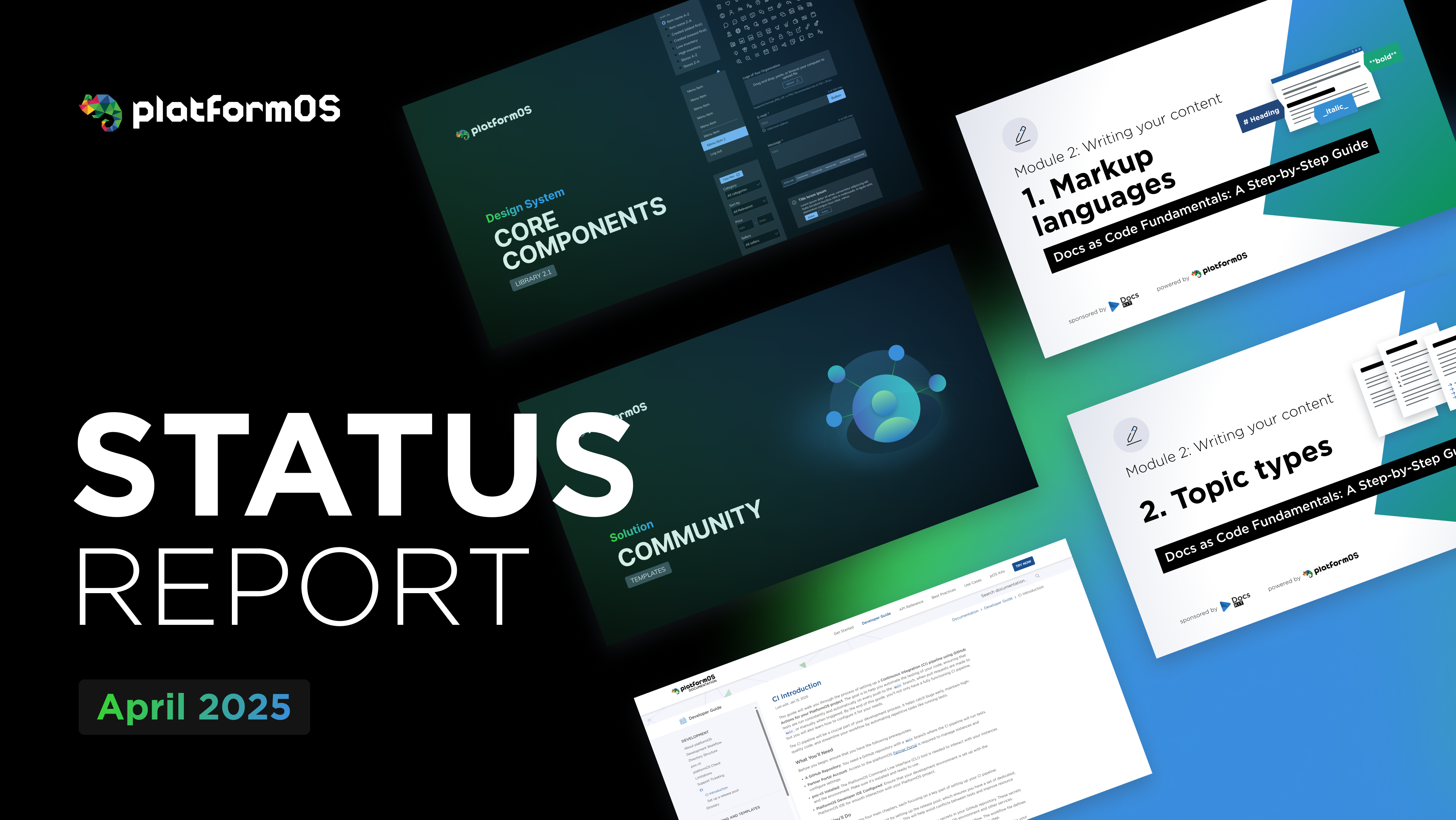





We are currently working on the renewal of our marketing site, which will feature a trendy new design, updated content, and user-friendly, consistent navigation. Alongside the website update, we will also release matching marketing and social media materials to ensure a cohesive brand experience.
We made major updates to the structure of the platformOS Design System.
Reason:
We had outgrown our existing templates—there were far too many of them.
Solutions were stored in the same file, which increased file complexity.
We’re currently updating variable names to ensure consistency between design and implementation. Since these updates affect all future projects and files, it's essential to work from an up-to-date system.
Managing design file updates was difficult, especially when integrating new features back into the MVP.
We wanted extended customizability and improved branding possibilities.
What we did:
Separated core components from solution-specific ones.
Set up a structured library system and created consistent file covers.
Published the Core Component Library—all solutions now reference this.
Defined the necessary libraries for each solution to ensure correct usage of assets and components.
Consolidated all flows into a single page within each solution file for easier navigation and design swapping.
Introduced plugins to automatically swap Variables (enabling easy theming via design tokens).
With this setup:
✅ Component modifications automatically update all linked projects (except for locally overridden tokens).
✅ Since all components link back to a single Core Library, copying files causes fewer issues.
✅ We can now update our solutions with new features more easily.
✅ Solutions can be easily shared with partners.
UX — Strengthening the platformOS Community Solution, Discovery Phase
At platformOS, our strategic vision prioritizes developing an exceptional Community Solution capable of addressing unified, broad-based community needs. Recognizing the diversity of our clients and their users, our Discovery phase focused intensively on creating generalized yet highly adaptable community personas and a versatile modular architecture. This foundational approach is essential for delivering scalable, personalized community experiences suited to a wide variety of industries and organizational contexts.
Strategic Focus: Understanding and Mapping Universal Community Needs
In our current discovery phase, we’ve undertaken a UX discovery phase to deeply understand generalized community user expectations, motivations, and behaviors.
Our methodologies included:
Generalized Community Personas: Developed flexible, industry-agnostic personas that clearly define universal user types and motivations. This strategic effort ensures that our Community Solution remains highly adaptable and relevant to diverse clients.
Persona-based UX Flow and Feature Prioritization: Translated these personas into detailed UX flows that prioritize essential community activities and features.
Leveraging Community Best Practices
We have meticulously integrated learnings from industry-leading communities, to align our UX strategy closely with proven community best practices.
Our key approach is a highly flexible, three-tiered modular community architecture that supports multiple segmentation approaches, whether organized around products, topics, or dynamic user interests. This modular framework enables rapid deployment, easier maintenance, and scalability, significantly enhancing our solution’s adaptability to client-specific requirements.
Flexible Homepages: Modular homepage components tailored to client needs and user engagement preferences.
Segment-driven Navigation: Clearly defined primary navigation, enabling intuitive access to community spaces and related content.
What’s Next: UX Wireframing and Transition to UI Design
Moving forward, our next phase will involve detailed UX wireframing, translating strategic insights and the modular information architecture into tangible, visual representations. This critical step prepares us to transition seamlessly to UI design, ensuring that the final product aligns closely with best practices and refined user needs identified during discovery.
Once completed, our partners and potential clients will benefit from a highly flexible, ready-to-implement Community Solution capable of delivering exceptional user experiences tailored precisely to their unique contexts.
By prioritizing this flexible, modular approach, we ensure platformOS remains a valuable, future-proof asset capable of consistently meeting and exceeding evolving community expectations.
We’ve added two new lessons to Module 2 of our Docs as Code Fundamentals course:
Lesson 1: Markup languages: Learn how markup languages like Markdown are used in documentation, how to convert content into structured markup, and how tools like MDX, Google Docs add-ons, and even LLMs can support your writing and migration workflows.
Lesson 2: Topic types: Discover how structured topic types (concept, task, reference) improve clarity and consistency in documentation. This lesson also covers additional topic types, the role of templates, and how LLMs can support structured authoring.
Stay tuned for Module 2 – Lesson 3: Style guides!
We have published a guide detailing the setup of a Continuous Integration (CI) pipeline for platformOS projects using GitHub Actions. This documentation provides step-by-step instructions on establishing a release pool of pre-configured instances, securely managing GitHub secrets, and configuring workflow files to automate testing processes.
To learn more about the most recent updates, enhancements and fixes in platformOS, check out our latest release note: platformOS Release Note 11 March, 2025 — Translation caching improved, fixed accept header construction
FIXED
Fixed wrong "Accept" header construction
IMPROVED
Improved internal Translations caching mechanism
platformOS Release Note 18 February, 2025 — Security fix for sanitizing HTML for old instances
IMPROVED
Staging email interceptor will now move cc and bcc recipients to the subject line as well
Check out the pos-cli release notes as well:
5.4.0
Improvement: pos-cli modules download
Improvement: pos-cli modules download
Improvement: Add –force-dependencies flag to pos-cli modules download
Subscribe: get status reports in email
Ensure your project’s success with the power of platformOS.